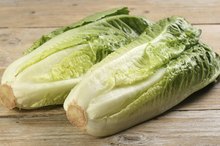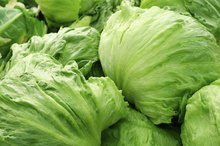What does fact checked mean?
At Healthfully, we strive to deliver objective content that is accurate and up-to-date. Our team periodically reviews articles in order to ensure content quality. The sources cited below consist of evidence from peer-reviewed journals, prominent medical organizations, academic associations, and government data.
The information contained on this site is for informational purposes only, and should not be used as a substitute for the advice of a professional health care provider. Please check with the appropriate physician regarding health questions and concerns. Although we strive to deliver accurate and up-to-date information, no guarantee to that effect is made.
How Much Beta-Carotene Is in Carrots?
Carrots can be a nutritious addition to your diet because they are low in calories but provide important vitamins and minerals. Among the nutrients carrots provide is beta-carotene, an antioxidant that is classified as a carotenoid 2. This is a type of nutritional compound present not only in carrots, but also in squash, spinach, sweet potatoes and peppers.
What Is Beta-Carotene?
According to MayoClinic.com, beta-carotene is so named because it was first discovered in carrots 2. Beta-carotene is one of three known carotenoids, along with alpha- and gamma-carotene 2. These compounds help give foods their distinct colors and act as antioxidants, protecting your body from oxidative damage. Beta-carotene can also be converted into retinol, a nutrient essential for healthy vision, or vitamin A, which ensures proper bone development and reproductive system function 2.
Beta-Carotene in Carrots
How Many Calories in Carrot Sticks?
Learn More
Carrots are a rich source of beta-carotene, as each 100 g serving of raw carrots provides 8,285 mcg of this nutrient 12. According MayoClinic.com, you need just 1,800 mcg daily to maintain healthy levels of vitamin A, so 100 g of carrots provides more than enough beta-carotene to do so 2. Beta-carotene is fat-soluble, meaning that you need to eat it with a source of fat in order for your body to properly absorb the carotenoid 2.
Beta-Carotene Benefits
MedlinePlus reports that beta-carotene has been suggested as a possible treatment for a wide array of conditions, although research indicates that it's not effective for all of these treatments 2.
Other Nutrients in Carrots
The Carb Count in Carrots
Learn More
Carrots provide a number of nutrients other than beta-carotene 2. Carrots are high in vitamin A and alpha-carotene, yet they are low in calories, as 100 g of raw carrots contain just 41 calories.
Related Articles
References
- USDA National Nutrient Database: Carrots, Raw
- MedlinePlus: Beta-Carotene
- University of Maryland Medical Center: Potassium
- Grune T, Lietz G, Palou A, et al. Beta-Carotene Is an Important Vitamin A Source for Humans. J Nutr. 2010;140(12):2268S-2285S. doi:10.3945/jn.109.119024
- Chew EY, Clemons TE, Agrón E, et al. Long-term effects of vitamins C and E, β-carotene, and zinc on age-related macular degeneration: AREDS report no. 35. Ophthalmology. 2013;120(8):1604-1611.e4. doi:10.1016/j.ophtha.2013.01.021
- Age-Related Eye Disease Study Research Group. A randomized, placebo-controlled, clinical trial of high-dose supplementation with vitamins C and E, beta carotene, and zinc for age-related macular degeneration and vision loss: AREDS report no. 8. Arch Ophthalmol. 2001;119(10):1417-1436.
- Neuman I, Nahum H, Ben-Amotz A. Prevention of exercise-induced asthma by a natural isomer mixture of beta-carotene. Ann Allergy Asthma Immunol. 1999;82(6):549-553. doi:10.1016/S1081-1206(10)63165-1
- Mcalindon TE, Jacques P, Zhang Y, et al. Do antioxidant micronutrients protect against the development and progression of knee osteoarthritis? Arthritis Rheum. 1996;39(4):648-656. doi:10.1002/art.1780390417
- Greenberger S, Harats D, Salameh F, et al. 9-cis-rich β-carotene powder of the alga Dunaliella reduces the severity of chronic plaque psoriasis: a randomized, double-blind, placebo-controlled clinical trial. J Am Coll Nutr. 2012;31(5):320-326. doi:10.1080/07315724.2012.10720430
- MedlinePlus. Beta-Carotene. Updated March 16, 2020.
- National Center for Complementary and Integrative Health. Antioxidants: In Depth. Updated November 2013.
- Paiva SA, Russell RM. Beta-Carotene and Other Carotenoids as Antioxidants. J Am Coll Nutr. 1999 Oct;18(5):426-33.
- Pryor WA, Stahl W, Rock CL. Beta Carotene: From Biochemistry to Clinical Trials. Nutr Rev. 2000 Feb;58(2 Pt 1):39-53. doi:10.1111/j.1753-4887.2000.tb07810.x
Writer Bio
Brian Willett began writing in 2005. He has been published in the "Buffalo News," the "Daytona Times" and "Natural Muscle Magazine." Willett also writes for Bloginity.com and Bodybuilding.com. He is an American Council on Exercise-certified personal trainer and earned a Bachelor of Arts in journalism from the University of North Carolina.









